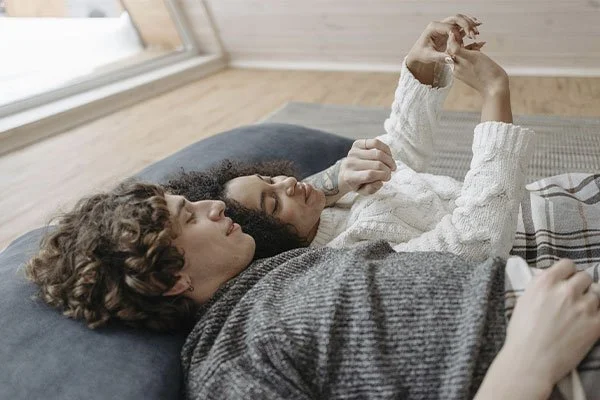Couples Therapy & Marriage Counseling in Los Angeles
Whether you’re facing infidelity, anxiety, or constant fighting, your relationship may feel like it’s falling apart. Conflict or emotional distance can build up over time, leaving you unsure of what to do next. Couples therapy and marriage counseling, in Los Angeles and online, can provide the support you need.
No relationship is perfect. Sometimes couples need help resolving conflict or better understanding one another—and there is no shame in seeking support. Couples therapy and marriage counseling are effective ways to work through these challenges and emerge stronger together.
Taking this step is a courageous decision, and I would be honored to help you overcome difficulties, strengthen your relationship, and achieve lasting, meaningful change.
Common Issues Couples Therapy and Marriage Counseling Can Help With
It’s perfectly normal for a relationship or marriage to face challenges sometimes. As a couples therapist and marriage counselor in Los Angeles, I can help you with a broad range of difficulties, including:
Communication struggles
Infidelity or breaches of trust
Persistent conflict
Lack of intimacy or emotional distance
Financial or legal differences
Life transitions
Looking for Couples Therapy and Marriage Counseling in Los Angeles, CA?
You may feel uncertain about seeking support, but I’m here to help—not only with this first step, but throughout your entire journey.
My Expertise as a Couples Therapist & Marriage Counselor
Though I work with a wide range of challenges, I have specialized experience in two specific areas.
Couples Therapy and Marriage Counseling for Infidelity
Infidelity can be devastating to a relationship. Rebuilding a relationship or marriage after infidelity is challenging, but it can also be an opportunity for growth, deeper connection, and renewed commitment.
I understand the complexities of infidelity, and with a compassionate, structured approach, I help couples address underlying issues, improve communication, and heal together—without blame or judgment—so they can move toward reconnection and renewed commitment.
Anxiety-Related Couples Therapy and Marriage Counseling
Anxiety can significantly affect relationship dynamics, often leading to miscommunication, emotional reactivity, overthinking, and changes in thinking patterns. Over time, these behaviors can create misunderstandings and conflict, straining the bond between partners.
In couples therapy and marriage counseling, we explore how anxiety shows up in your interactions, identify triggers and patterns, and develop practical strategies—such as mindfulness, healthy boundaries, and effective communication skills—to reduce its impact and strengthen your relationship.
My Approach to Couples Therapy and Marriage Counseling in Los Angeles, CA
I use a variety of therapeutic approaches tailored to your unique needs. My goal is to provide a safe, supportive environment where you can explore your feelings, identify challenges, and develop effective solutions.
Some of the approaches I draw from include:
Emotionally Focused Therapy (EFT)
EFT views emotional bonds as the foundation of a healthy relationship. As such, it focuses on identifying and expressing emotions, improving emotional responsiveness, and fostering secure attachments between partners—ultimately helping reduce distress and disconnection.
Cognitive Behavioral Therapy (CBT)
CBT is especially helpful for addressing communication issues, infidelity, and anxiety. It helps couples identify negative thought patterns and behaviors, challenge them, and replace them with healthier ones—leading to healthier interactions and more effective conflict resolution.
Gottman Method
This research-based approach focuses on building a strong foundation of friendship, managing conflict, and creating shared meaning. It provides practical, structured tools to help couples improve communication, increase intimacy, and address underlying issues.
Integrative Behavioral Couple Therapy (IBCT)
IBCT helps couples stuck in their relationship dynamics find new ways to connect and resolve conflicts. It combines behavioral interventions with acceptance-based strategies, helping couples change negative patterns while understanding and accepting each other’s differences.
Connect with a Couples Therapist and Marriage Counselor in Los Angeles, CA
Ready to work on your relationship or marriage and improve your connection? Therapy for Adults is here to help.
1. Reach Out Today
Get started by scheduling your free 15-minute consultation or by filling out the contact form available here.
2. Start Your Healing Journey
As your couples therapist and marriage counselor, I will guide and support you throughout this transformative path.
Frequently Asked Questions
-
One study shows that couples therapy and marriage counseling have a positive impact on 70% of couples, while the American Association for Marriage and Family Therapy reports improved emotional health in 90% of clients.
While the effectiveness of therapy depends on each couple’s unique needs, certain approaches—such as the Gottman Method and Emotionally Focused Therapy (EFT)—are widely recognized as highly effective.
-
Couples and marriage counseling can help repair and heal a broken relationship, and the willingness to attend therapy together is a promising sign that both partners are invested in improvement. Healing requires vulnerability and honest conversations, so commitment to the process is essential.
-
There are several ways to mentally and emotionally prepare for couples therapy and marriage counseling. Before your first session, I recommend reflecting—either individually or as a couple—on questions such as:
What do I want out of couples counseling? What are some of my tangible goals?
Am I willing to be vulnerable and honest?
What concerns or worries do I have about couples or marriage counseling?
Am I committed to the process?
Your answers can also serve as valuable discussion points during the first session; however, it’s completely okay if these insights emerge only during that session. If there are differences in your goals as partners, I will help you find common ground to work together.
-
When starting therapy, many people wonder where to start and what they’re going to talk about. However, this can add unnecessary pressure to the process by racking and taxing your brain for things to discuss.
Your couples therapist and marriage counselor is a trained professional—they’ll guide you through topics to help you get the most out of therapy and improve your relationship.
Common topics of discussion include:
Conflict resolution
Communication styles
Sex, sexuality, and intimacy
Children or in-laws
Politics, religion, culture, beliefs, and values
Finances, lifestyle choices, or personalities
Social life
Individual past experiences and emotional struggles
-
Yes, couples therapy and marriage counseling can be beneficial even if you are considering separation or divorce. Therapy can provide a supportive space to explore your feelings, improve communication, and make informed decisions about the future of your relationship.
If separation or divorce is the chosen path, therapy can also help facilitate a more amicable and respectful process—especially when children are involved.
Other Therapy Services I Offer in Los Angeles, CA
In addition to couples therapy and marriage counseling, I offer therapy for dating and relationship issues for individuals and couples, as well as support for highly sensitive people—available both in-person and online across California. I also provide dating coaching for clients anywhere in the United States.
Find Help for Your Relationship or Marriage in Los Angeles
I’m here to help you uncover what’s keeping you stuck—you don’t have to feel like your relationship or marriage is doomed. Let’s begin this journey together.


